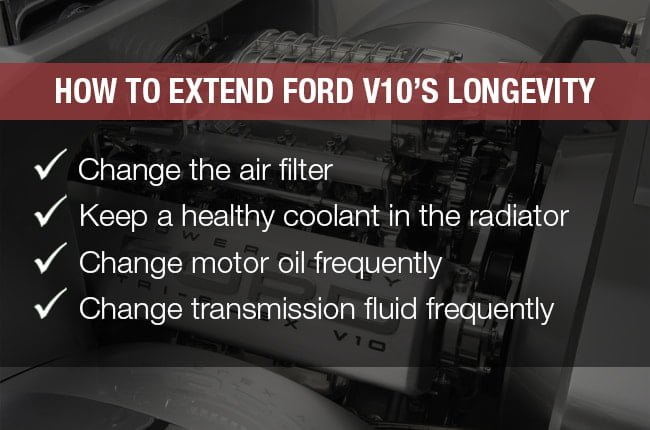If you’re hitting the market for a used heavy-duty Ford truck, then you might want to know how much life is left in the engine. Ford installed the V10 as part of their modular engine lineup in super duty trucks produced within 1999-2010. What’s more, is that these super-duty trucks are way cheaper than comparable diesel trucks.
The big question is how can you determine the life expectancy of a used Ford V10, and how do you extend it to return value for money? This article contains everything you need to know, so stick around.
Ford V10 Overview
In the late ’90s, Ford introduced two new engines; the 5.6L V8 and the V10 engine. The V10 had two valves, and its production was steered up to 2005. Ford usually mounted these engines on RVs and full-size vans. However, with time, Ford consumers would be seeing the V10 powering their F-series pickup trucks.
In 2005, Ford upgraded from a 2-valve to a 3-valve V10 engine. The latter boasted 460 lb-ft torque and 365 horsepower, which significantly increased from the 2-valve V10. The enhanced power saw the V10 gain popularity among large F-series trucks and some buses.
However, in 2010, the 6.8L was discontinued from use in the super duty line of pickups. The V10 became popular among commercial Ford vehicles until 2019 when it was scrapped entirely.
Every customer knows how durable Ford products are. The V10 engine is loaded with a handful of pros that spearheaded its popularity back in the day. However, the V10 comes with its set of cons as no engine is perfect. Let’s jump straight into that.
Benefits of The Ford V10
- Durability
A good number of Ford consumers of the Ford V10 claim that this engine is one of the company’s most durable offerings. You can hit the 200,000-mile mark with minimal maintenance.
- Price
The V10 Ford is a budget engine, a couple of bucks cheaper than other diesel pickups out there. Due to that, used Ford V10s are easy to find in the market.
- Gas power
The V10 is an excellent option if you’d prefer a gas engine over a diesel one. With 365 hp and 460lb-ft of torque, the V10 outpowers most modern diesel engines, and therefore a good choice when plenty of output is needed.
- Best for off-road
V10’s power output is perfect for towing and off-roading.
Drawbacks of The Ford V10
- Poor fuel economy
You’ll probably purchase the Ford V10 for its power output, not fuel economy. Recording less than 10mpg on average, the V10 is known to guzzle gasoline more than its competitors. Moreover, if you’re towing along another car/RV/trailer, the V10 gives a fuel consumption rate of 5mpg, which might become expensive to maintain.
- Low speed
Again, the V10 mainly focuses on power output and not speed. That makes it a slow but powerful engine, perfect for off-roading.
Ford V10 Life Expectancy
There’s no general rule when it comes to an engine’s lifespan, but there are a few available figures that give you a rough idea of what to expect from it. A little while ago, the average lifespan of a car engine was around 150,000 miles or eight years. However, new technology and engine designs have pushed the lifespan to about 200,000 miles or ten years. Therefore, judging by the mileage on the Ford V10, you can get a rough estimate of how much time you have left till the engine needs replacement.
You can always expect to have at least ten years of life on your V10 (approx 200,000 miles) with proper maintenance. Some users claim that the V10 rewards around 50,000-100,000 more miles if properly maintained. If you’re getting a used Ford V10, then do the math. Besides, life expectancy depends on several factors; let’s look into them.
What Affects The Ford V10 Life Expectancy?
Topography/Living area
Where you live will determine the rate at which your engine wears out. For instance, if you live up a steep hill, you’ll be regularly traversing rough terrain. As a result, your engine will undergo stress, and might not last as long as it would have if you drive on flat terrain.
Maintenance
It is a no-brainer that how you maintain your engine will determine its life expectancy. If you are timely on all routine maintenance practices, then you might drive your car for years or even decades.
Driving Skills and Habits
You shouldn’t over-race your car while driving to maintain a low risk of wearing the engine. It constantly submits the engine’s cylinders to excessive pressure and heat when you hit the maximum rpm, increasing the chances of you facing the repair shop frequently. It would be best if you drive defensively at all times, so as to get the most out of your Ford V10.
Type of Vehicle
That might be the oddest factor affecting an engine’s life, but it does. The V10 engine lasts longer in smaller cars than in heavy-duty trucks.
How to Extend Ford V10’s Life
Here are some maintenance practices that will help prolong your Ford V10’s life expectancy.

Change The Air Filter
It becomes hazardous if a tiny particle gets through a damaged air filter into the internal engine parts. It causes damage to vital components like the pistons and cylinders, which are costly to repair. That is one reason why you need to maintain healthy air filters in your Ford V10. Clean air filters are designed to capture debris and dirt, preventing them from reaching the engine’s combustion chamber. Since every part is prone to wear, you should repair your air filters after every 12,000-15,000 miles.
Keep a Healthy Coolant In The Radiator
Your Ford V10, like all other engines, produces heat during operation. Some of the heat is directed to your cabin for comfort, but the rest needs to be managed in different ways. Your car relies on the engine coolant to stay at optimal operational temperature. Otherwise, your engine will overheat and start wearing out slowly if you ride with low coolant levels.
It is, therefore, essential to keep a healthy coolant level on your radiator to be on the safe side. Low levels might be brought about by external or internal leaks and radiator cap leaks.
Change Motor Oil Frequently
An oil change is pivotal in maintaining your engine’s lifespan. Since a working engine never runs short of moving parts, adequate oil provides the needed lubrication to absorb friction between moving parts. By that, your engine parts will not wear out fast, and you’ll record a good lifespan.
Motor oil, moreover, helps in cooling engine components, and maintaining proper oil levels prevents overheating.
Frequent oil change also aids in removing sludge or particles hidden within the engine components.
Now that you see the importance of changing your oil frequently, here’s one of the best options for your next motor oil refill.
The Castrol EDGE is a full-synthetic engine oil designed for the users who command optimum performance from their engines. It is 3X more potent than other popular motor oils in terms of viscosity. The Castro 03084 promotes performance and fuel economy and has become the most popular motor oil out there. The Castro 03084 is the best full-synthetic motor oil money can buy.
Replace Transmission Fluids Frequently
Transmission fluid acts both as a lubricant and coolant to your engine. Maintaining healthy transmission fluid levels is essential to your engine’s health. Always take note of the levels using your dipstick before you set out for a journey to avoid riding on low levels, which is harmful.
Here’s a quality transmission fluid choice.
The MERCON ATF is a Ford-approved transmission fluid that offers quality at a lower price than several other transmission fluids. The more frequent you replace it on your V10, the healthier your engine will be.
FAQs
1. Is the V10 better than the V8?
The general rule is that more horsepower is achieved with more cylinders. That makes the V10 more potent than the V8. However, considering other general factors like complexity and maintenance, the V8 might edge the V10 in terms of the ‘overall’ better choice of the two. You’ll need first to know what you’re looking for in either engine to determine the better one.
2. How much Horsepower (HP) does a V10 engine have?
The 1999 6.8L Ford V10 has 305hp; the 2000-2004 model has 310hp, while the latest model (2005-2010) came with 362hp.
3. What is the Ford V10’s oil capacity?
The V10’s user manual states that you need 7 quarts of oil when changing the filter to fill your tank.
Final Thoughts
The Ford V10 is a great engine; it was unique, robust, and reliable for heavy tasks, even with its set of drawbacks. However, with proper maintenance, the V10 can serve you for a lengthy period and pay back the investment you put into it.
If you’re looking for a new V10, it might be hard for you to get one, but quality used choices are available in the market.
Bonus: 3.6 Pentastar High Mileage Life Expectancy: Is It a Good Engine?


